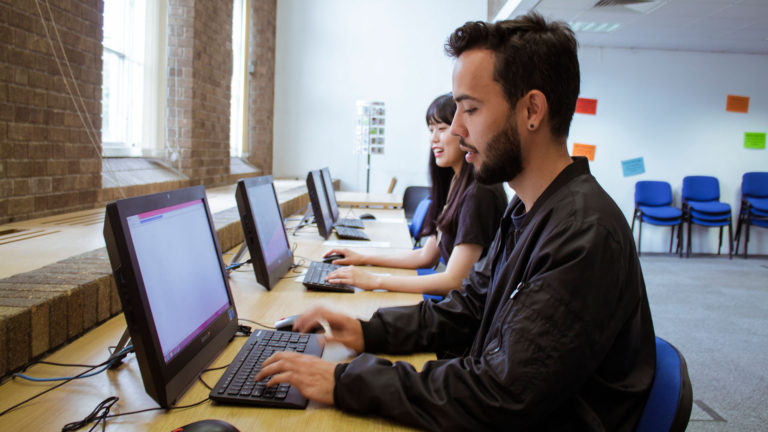
10 tips to learn to speak English fluently online
English language schools usually provide engaging in-classroom courses. Some have also offered online courses, and many have adopted this method during the worldwide pandemic.
Expert teachers and top-quality learning management systems are used to provide you with engaging online courses to help you learn to speak English fluently online.
Language schools are dedicated to providing all students with practical methods to learn English fluently and quickly with any course. Such a learning experience is especially true when students are choosing to improve their English fluency online before the world starts moving again.
Joining any Online English language course means that you will be responsible for where you study, prepare, and how effectively you use the learning technology. The amount of self-study you complete outside your online classes.
Follow these 10 tips to learn to speak English fluently online:
1. Equipment
It is good to examine your equipment to get the best from your online studies. The sessions will use text-based engagement but also include sharing devices and using audio and video.
Try to test your webcam and your audio settings before each class.
Also, make sure you adjust the height of your chair, the position of your keyboard, and the screen so that you are comfortable. Your arms and thighs should be level and parallel to the floor, and your wrists should not be bent while typing.
2. Preparation
Language schools use various systems (Zoom, Edmodo, Google Hangouts, Microsoft Teams.) for online English Language courses.
Make sure you follow school guidelines to set up simple accounts on platforms (free and straightforward) that teachers will use. Make sure you take a look at their features if you have not used the platform before.
3. Location of Study
As students are studying from home right now, try to arrange a comfortable area to complete your online lessons. Try to have a space with a chair and table to quickly make notes, hear the session well, and not be interrupted by anyone while taking part in your classes.
Be sure to let your housemates or family know when you will be online in a lesson to avoid any disruption or noise.
As well as being comfortable, avoid distractions like music/TV. Turn off your mobile phone (unless being used as part of your lesson).
4. Keep at It!
Successful online English language study takes work and persistence. Do not be affected by technical issues like poor sound. These things can happen, but work through them and keep working hard online.
5. Effective Communication
It will help if you communicate well when learning online, especially when you need to ask questions or do not understand your teacher’s instructions the first time.
Language school teachers are all used to teaching in physical classes. Many have previous experience in teaching online and will be patient and supportive.
With online learning, and the fact that teachers are likely to be looking at many students’ faces, they may not be able to pick up confusion or frustration through video images, so if you are struggling, make your teacher aware, and they will help.
Try to be as transparent as you can when taking part. Make sure your volume settings are correct and speak as clearly as you can. Do not be afraid to ask your teacher to repeat an instruction.
6. Technical Skills
Learning online means that you will have to master some basic technical skills.
Firstly, using an online platform is essential. However, things like sharing documents, navigating the Internet or downloading and watching videos will be commonplace.
If you need any advice about the software needed, please let your language school know, and we will help you get ready for your course.

7. Be Motivated
Successful online learners must want to succeed and get the very best from a course.
Online courses require you to be independent, motivated, and responsible for taking part and continuing your online learning with any work set by your teacher for revision and self-study.
Classes in language schools are very structured, and academic and administrative staff’s attendance is firmly checked and encouraged. You must show self-discipline when completing any online English course.
8. Keep Notes
Why not keep an English language learning journal? These can be useful for online learning because it is likely that activities (visual or written examples) given to you via the learning management system might not be available after a certain length of time after class. This is the ideal place for noting any questions you want to ask or any areas you may need to work on after your session.
Many students use Google Docs to access this from any device to update their thoughts, questions, and notes and remind themselves to revisit certain areas.
9. Do some reading and self-study before/after each class.
Online English courses follow a week by week structure of timings and activities arranged by your chosen language school.
This is useful, but it can also really pay to read ahead. Once you have finished a class, spend some time looking ahead to see what is coming up. Your teachers will also often make suggestions for work to download before the next lesson. You will be able to see the next subject and get excited about it.
Also, start any assignments/homework as early as possible. If you leave your notes for a few days and then return to them, you may find the assignments take longer as some re-reading may be required.
10. Relax & Enjoy!
Do not stress if you feel like you are falling behind. English language teachers are trained to teach online and have many years of experience supporting all kinds of students. Your teacher is there to help you get the most from your course, so stay relaxed, ask questions and ask for help if you need it.
Other students may be feeling the same. So, do not be worried about asking your teacher questions. Enjoy!
At Delfin, we want to offer you the chance to improve your English fluency even before (or after) you physically travel abroad to study at one of our English language schools.


